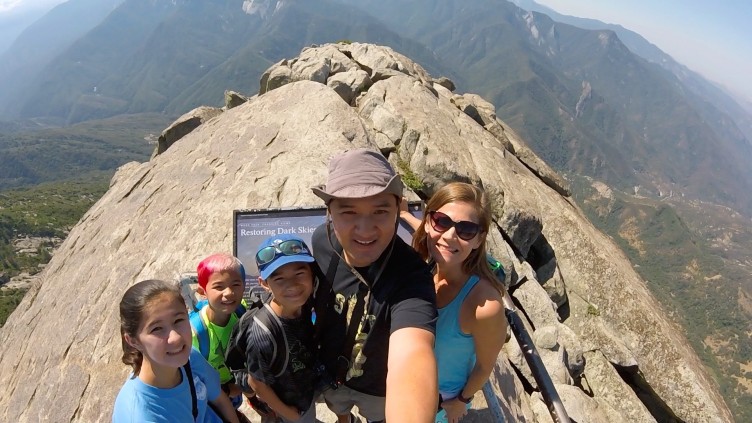
In 2008, I spent 10 days in Los Angeles for a photoshoot. For six years, I’d worked 60–80 hour weeks heads-down in business, traveling around the country and sacrificing hobbies, side-projects and, most importantly, time with family in order to grow my career. But while I was in LA on this trip, all three of my kids had major events: a ballet recital, a lost tooth and a speaking breakthrough from my 1-year-old. As I sat in my thoughts on the red-eye flight home, I had my Jerry Maguire moment. But instead of my mission statement reflecting on more personal attention for clients, my moment resulted in a different type of revelation: “I need balance.”
Shortly thereafter, I jumped off the hamster wheel and focused on balancing my professional and personal life. I discovered that a well-rounded, active life outside of work isn’t just necessary for us as humans, but good for us as workplace contributors. When we get trapped in a mad dash to the top, we sacrifice the equilibrium that makes us better people for clients, coworkers and everyone in our life.
Through my career twists and turns, I’ve come to understand the importance of bringing your full self to work. Showing up more authentically helps create genuine workplace connections and makes work more fulfilling. In this new era of work, I’m worried about losing this essential element. In allowing for more flexibility, I don’t want us all to become nothing more than moving boxes on other people’s screens.
As a leader, I’m constantly asking what my team needs to thrive. Not just to be efficient or productive, but to thrive as humans and teammates. Today, we all need balance — and that starts with workplaces acknowledging our humanity.
Celebrating the “Side Stuff”
Soon after my epiphany on the plane, I came to Raleigh expecting to shift my energy to my family and hobbies and possibly ease into a less rigorous work schedule. But I quickly realized that I didn’t have to choose. My work and my personal life are both parts of my story, and both contribute to who I am. In fact, maintaining hobbies in conjunction with work made everything more impactful, and helped expand my creative horizons.
A less demanding work schedule meant I had more time to explore other passions. So, I pushed myself to try new things. I blogged, I created YouTube channels, I dove into photography and traveling. All of these “side” activities added color to my daily life that I had been missing when my job reigned supreme. As a CEO, I don’t want my team to have to make this same discovery — their job shouldn’t dictate their entire life. In social settings, you sometimes meet people who start with their job title in describing who they are. To me, that is a warning sign that work is taking over.
Our founder, Brooks Bell, established a culture that centered on having a personal life while also doing good work. I aim to continue this legacy and lead by example. My team knows I never hide what I’m up to outside of my CEO duties. If someone asks how my weekend was, I’ll share if I photographed a soccer game or went on a great day hike with my family. It’s a small gesture, but I hope it reinforces to employees that their non-work interests are helpful, not harmful, to their work contributions. To me, Slack conversations about gardening or pre-meeting debates over true crime series are proof of a strong culture and an engaged team — not of distracted employees.
Bringing your authentic self to work isn’t about forcing extroversion or making employees share personal details. Rather, it’s about creating an environment where people can show up (in person or virtually) in the way that feels most comfortable to them. My goal is to create an organization that moves beyond transactional relationships and celebrates all parts of our stories.
Creating Connections
Work shouldn’t just be tasks we complete and then leave. With such a significant portion of our lives spent on a computer, we must be intentional about drawing connections and seeing each other as humans before coworkers. Forgetting our shared humanity leads us down a one-way path to the “life sucks” culture described in Dave Logan’s “Tribal Leadership.”
In the services business, the long-accepted hierarchy of needs has been client first, then industry, then team. At Brooks Bell, we’ve shuffled the model to put our team first. We care about the work we do, but sacrificing our own livelihoods and well-being to serve clients doesn’t mesh with our values or allow our team to thrive.
In many industries, titles hold a lot of glitz and glamor. The ladder-climbing to achieve an executive spot can take over your entire life. Take it from someone who has a very coveted set of three letters in front of my name: Without an underlying mission, strong workplace bonds and a healthy work-life balance, it’s not worth it.
When I’m at a cookout or other social event, I don’t introduce myself as a CEO. Nor did I cling to the title of Creative Director, YouTuber or photographer. I don’t want to be known as just one thing or defined by a job — and as a leader, I want that for my employees, too. When we travel with teammates, we often get to know them in a more genuine, holistic way and build stronger connections. How can we create that every day?
Our Ongoing Challenge
I believe that balance in our jobs makes us better coworkers, managers and people. This isn’t a meticulously researched opinion, but one based on a gut feeling and common sense. In an age when burnout is common, we all need space to decompress, show up for loved ones and discover creative outlets. In other words, we need balance.
I don’t have a comprehensive strategy or blueprint for achieving this goal, especially as more workers (rightfully) gain the flexibility to work from home. But I am passionate about it because of my own experience. I shrunk my job title to one aspect of myself and embraced the others: dad, photographer, traveler, runner, bourbon collector. Sometimes I may place more attention in one area or another, but overall, striking this balance has transformed my life.
These conversations are essential, especially at a time when the way we work is changing dramatically. I don’t have all the answers, but I care about creating workplaces where we can exist as our full, mutli-dimensional selves. Wherever the future of work takes us, recognizing our humanity should be the first priority.
Is your organization taking steps to help create balance? I would love to hear your thoughts and swap ideas. Let me know — let’s work together to make work better.
